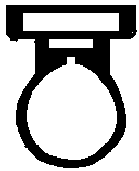English
111
Fall, 2001
Don Maxwell
Toilet Paper

The only time I
can
remember Thanksgiving falling on my birthday when I was a child, Uncle
George Wagstaff came to dinner. He was an uncle by marriage, on my
father's
side, and he lived in Chicago. He was about seventy years old. It was
the
only time he ever visited us.

As my mother was placing the roast turkey on the dining room table,
Uncle
George went upstairs, "to wash up," he said. The rest of us gathered
around
the table, choosing seats and declaring how delicious the food looked
and how wonderful it smelled. After a while, my mother suggested that
we
sit down, that Uncle George wouldn't mind if we went ahead and carved
the
turkey. Just as my father picked up the carving knife and the big fork,
there was a small sound like a raindrop falling on a book--BUP--and my
father gave a sudden start and stared hard at the center of the breast
of the turkey. There was another BUP and this time I started
because
something hit me on the cheek. I saw my father then peering at the
chandelier,
where a drop of brownish liquid was forming on the bottom of the
central
finial, about two feet above the turkey. Right then, we heard Uncle
George's
quavering voice from upstairs, calling my father.
"Don," he was saying. "Don, come quick."
My father had been a sprinter in school, but I'm sure he never got off
the mark faster than he did that day. He just seemed to vanish from his
chair and we could hear his feet pounding up the stairs to the
bathroom.
He got there too late, of course.
I don't remember what we finally had to eat that day, but I do remember
that Uncle George and my mother spent a lot of time apologizing to each
other. I think he left early, and we never saw him again. We heard that
he died a few years later.
This story--it's true, by the way--could have had a happier ending if
only
Uncle George had known how to keep a clogged toilet from overflowing.
And
it brings us to the next invitation to write. Here's what to do:

- Locate a standard, domestic flush
toilet.
- Observe it in operation
- Write out instructions for someone
like Uncle
George who's desperately trying to keep a clogged toilet from
overflowing.
Tell him or her what to do to prevent the rising water from flooding
the
floor. There are several possible remedies, but only one will
keep
the floor dry. How will you explain the remedy to someone who is
in a great hurry but who hasn't poked around inside a toilet? By the
way,
if the toilet you study happens to be one of the newer ones that flush
with only a small amount of water, it might not ever overflow. But
study
it anyway-because most American domestic flush toilets will,
and
they all work the same way. And you never know...
In case you're wondering, this job involves serious, objective,
scientific,
field research. Observation.
Let's see how well you see.
Your instructions will be examples of technical writing. Like any
technical writing, they'll be helpful if you have first seen
accurately how toilets work and then explained what to do in
this
emergency.
(There's nothing hard about this job, by the way. But I've tried
it out on several other classes, and in most of them only one or two
persons
saw
accurately.
Some didn't even lift the top off of the tank and look inside.)
Please bring your instructions to class next time. And remember that
your
audience for what you write is the entire class--and of course, anyone
else who might someday find themselves in Uncle George's predicament.
So
you'll want to keep their needs in mind as you compose and write your
instructions.
P.S. You might also find it handy
someday
to know the answers to these two questions: If there were no other
water
available, would it be safe to drink from the toilet bowl? How about
from
the toilet tank?

Invitations
to Write

.
![]()
![]()


![]()